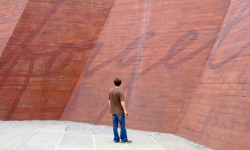
The Baptist movement’s one great distinctive—and its one great contribution to the wider body of Christ—is its radical vision of the church. Charles Hewlett shares a presentation made by Carey Baptist College’s John Tucker and Andrew Picard at Hui 2019, about a New Zealand Baptist vision for church.
The early Baptists, believing the state church of their day to be corrupt and ungodly, separated from that church in order to form radical communities of believers who were deeply committed to God and to one another. Drawing on Scripture, they argued that a true church is a community of disciples who Christ gathers together to live under his rule in committed relationship both with God and each other.
Our forebears believed that when they gathered together, Jesus Christ was present in their midst and his presence changed everything. The text that gripped their hearts was Matthew 18:20: “where two or three are gathered in my name, I am there among them.” Not “I might be there among them,” but “I am there among them.” It’s this promised presence of the risen Christ in the gathered church that is the beating heart of the Baptist vision, and it has profound implications for discipleship, leadership, worship, resourcing and mission.
1. Discipleship: walking together as a committed community
Many Christian traditions believe that discipleship—walking with Jesus—requires withdrawal from the distractions of community into quietness and solitude. However, we Baptists, with our emphasis on the dynamic presence of Christ in the gathered church, believe that growth in Christ can only occur within the context of a tightly-knit community. We can’t really know Christ without knowing the members of his body. We can’t really love Christ without loving the members of his body—not just the ones we like, but the ones we don’t like.
But this kind of community never happens by accident. There needs to be a degree of intentionality. That’s why our forebears often drew up formal written covenants in which they solemnly promised to give themselves both to the Lord and to one another, walking together in all his ways “whatsoever it should cost them.” It’s this practice of covenanting together that underlies our modern practice of church membership, although the membership processes in most Baptist churches today bear very little resemblance to the radical, counter‑cultural commitment envisaged by our forebears in the faith.
If our churches are to be thriving faith communities filled with growing disciples, it will mean placing much greater priority on the formation of authentic community. In New Zealand today, where families and communities are often broken and relationships superficial, one of the most powerful missional strategies we can adopt is simply to recapture this dynamic of walking together in love, even when—especially when—we disagree with, or differ from, one another.
2. Leadership: seeking together as a listening community
The Baptist vision also has profound implications for leadership in the church. Because Christ by his Spirit speaks directly to every believer, we’re convinced that every believer in the local church should be involved in discerning Christ’s will for that church. And because Christ promises to be present and to make his will known whenever his people gather together in his name, the church meeting is the place where we can expect the Spirit of Christ to reveal the mind of Christ. Jesus Christ is the leader of the church, therefore final authority in any church rests not with the pastor, or the elders, but with the risen and ruling Christ in the midst of his people as they gather together to listen prayerfully to his word in Scripture and through community.
This does not mean the absence of human leaders. The New Testament teaches that Christ gives leaders to the church. As Baptists, we’ve always recognised this fact by appointing pastors, elders and deacons. But their leadership is secondary to Christ’s leadership discerned by the gathered community. Therefore, one of the ways leaders lead is by resourcing church members, and listening to those members when they gather together in Christ’s name to seek his will. As the scriptures indicate, Christ often speaks through people on the margins. Effective leaders actively look for ways to promote the voices that tend to be marginalised in their faith communities.
This vision of congregational discernment does not have to degenerate into bitter formal debates decided by a majority vote. The church is not a democracy. It’s a Christocracy. The goal when we gather together is not to win a vote and impose our will, but to listen to the voice of Christ, and to submit to his will. This means framing our meetings with shared reflection on Scripture and prayer. It means bringing issues for discussion and discernment, not just motions for decision and voting. It means distinguishing between management and discernment. No one aside from Jesus Christ is competent to discern the Father’s will on behalf of the community. Only Christ knows the Father’s will and he reveals it by his Spirit to the community.
3. Worship: worshipping together as a Christ-centred community
Historically, Baptist worship has been shaped by three main values. Firstly, we have placed great emphasis on the reading and, especially, the preaching of Scripture. We believe the preaching of the Word of God is the Word of God. We believe the risen Jesus addresses his people through preaching that is rooted in the Bible. The whole movement of every worship service can, therefore, be seen as three phases: (a) approaching the Word of God, (b) receiving the Word of God, and (c) responding to the Word of God.
Secondly, because we believe that Christ speaks through all the members of his body, we have tended to encourage broad participation in worship. Early Baptists made sure that a range of people—not just the pastor—were given the opportunity to speak during worship. Anyone could lead communion. Anyone could share their testimony. Anyone could preach a sermon—including women ‘she-preachers’, a radical position at the time. Baptist services, in fact, often consisted of multiple sermons, preached in succession by different people, with interjections during each message and enthusiastic discussion afterwards.
Baptist worship has also been marked, thirdly, by a deep concern for freedom. We believe that the risen Christ by his Spirit leads his people when they gather to worship. Consequently, the members of his body must be free to respond to the Spirit’s direction. We value spontaneity, flexibility, variety and creativity in our worship.
4. Resources: uniting together as an interdependent community
The Baptist vision of church has significant implications for how we deploy our resources. Baptists believe that final authority over any local church rests not with a bishop or a national council but with the risen Christ who promises to be present and make his will known whenever that church gathers together to seek his will. So the members of every local church are accountable ultimately to Christ and what they discern he is saying to them. In that sense they are free from external coercion.
However that freedom does not mean unbridled autonomy. As Baptists, we don’t believe that local churches are autonomous or independent. Rather, we believe they are interdependent. Like the members of a body (1 Corinthians 12), local churches need the support of other local churches. As members of the body of Christ, we’re not freed from relationship; we’re freed in and through relationship.
Therefore, from their beginning, Baptist churches have recognised the need to draw on the experience, insights and resources of other congregations. Drawing on texts like Acts 15, they have gathered together in regional associations and national unions in order to share wisdom on difficult or controversial matters, to provide financial support for congregations in need, and to plan combined mission initiatives.
5. Mission: witnessing together as a gospel community
More than most denominations, Baptists have been relentlessly focused on mission. Steve Holmes writes that “it is difficult to think of another Christian tradition that has so uniformly seen mission as being so central to its vision of the life of the church.”1 Why? With our insistence that no one can enter the church without first hearing the call of Christ in the gospel, we believe that evangelism is an absolute imperative. You see this in Baptist leaders like Thomas Helwys, Johann Oncken, Rosalie McGeorge, Hopestill Pillow and Billy Graham.
However, the Baptist vision of mission extends beyond the redemption of individuals to the renewal of social structures. From their experience of persecution, Baptists were freedom fighters who demanded that unless there was freedom for all there was no freedom at all.
William Carey in India led the campaign to abolish sati, or the burning of widows on their husbands’ funeral pyres. Martin Luther King Jr, a Baptist minister, directed the campaign for civil rights in the USA. In Aotearoa, Vivienne Boyd worked for justice for women and J.J. North fought in defence of conscientious objectors. For Baptists, mission means preaching the gospel of Christ’s Kingdom both to lost sinners and fallen systems.
But mission is not just something we do; it’s something we are. As the first fruits of God’s Kingdom, the church is the trailer to God’s great movie of redemption. If people want to know what the movie is like, they just need to watch the trailer. They just need to look at our churches. When they look, will they see signs of the Kingdom, signs of reconciliation and justice? One of the most strategic missional strategies we can adopt is to work hard at embodying Christ’s will in our common life as local churches.
Story: Charles Hewlett
Charles is the national leader of the Baptist Churches of New Zealand. He is often heard saying, “I love Jesus. I love the Bible. I love the gospel. I love the church. And I love mission.”
Follow Charles Hewlett on Facebook: charles.hewlett.nz | Instagram: charles.hewlett
Scripture: Unless otherwise specified, Scripture quotations are from New Revised Standard Version Bible, copyright ©1989 National Council of the Churches of Christ in the United States of America. Used by permission. All rights reserved.


